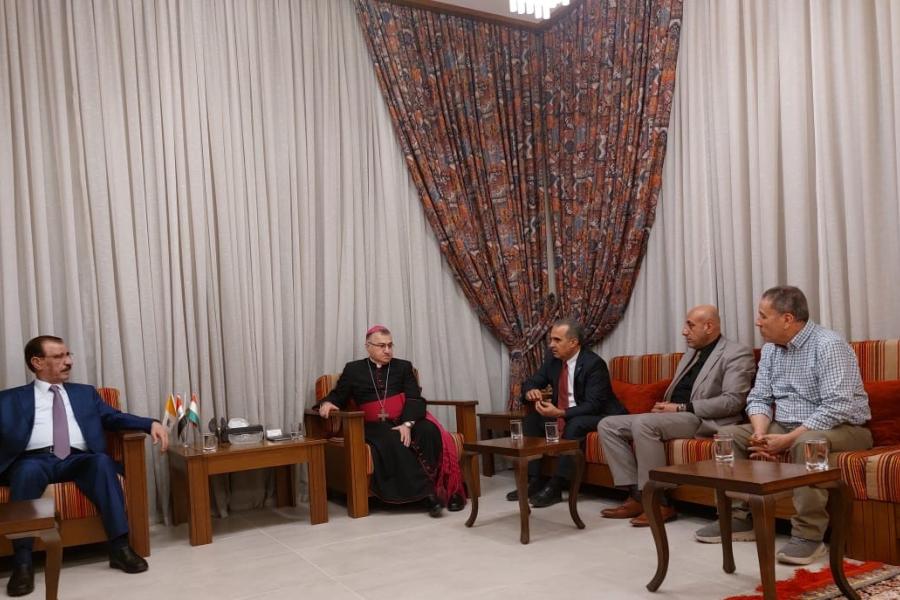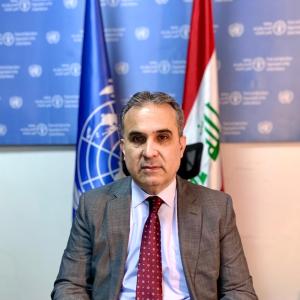The Minister of Agriculture and FAO Iraq Representative meet with Archbishop Bashar Matti Warda: Achievements of FAO's interventions and its impact on the socio-economic levels in the liberated areas in Ninawa
29 August 2022
Erbil, 28 August 2022
His Excellency the Minister of Agriculture, Engineer Muhammad Karim Al-Khafaji, and Food and Agriculture Organization (FAO) Representative in Iraq, Dr. Salah El-hajj Hassan, the Director of Ninawa Agriculture, Dr. Rabie Youssef and the Senior FAO Livestock Expert, Dr. Chedly Kayouli visited his Eminence Bashar Matti Warda the Archbishop of Chaldean Catholic Church in Erbil as a follow-up to the field visit made to the partners under the EU-funded project: “support to agricultural livelihoods of rural and peri-urban returnees and communities in Nineveh Governorate”, and implemented by FAO in close cooperation with the Ministry of Agriculture.

The discussion focused on the activities of FAO in Ninawa and ways to help the returnees who were supported by the project to improve the marketing of their dairy products and possibilities to facilitate the transportation of their improved processed dairy products to Erbil with distribution to hotels and restaurants in Ankawa taken the high demand for such local traditional and special quality products.
H.E The Minister stressed the importance and success of the project’s interventions, which helped the displaced families that were affected by ISIL conflict to return home, and praised the expertise and support provided by the project team, which contributed to increasing the efficiency and quality of local products, which became world-class standards highlighting the importance of helping families to sell their products in Erbil. The Minister added that he strongly supports agricultural interventions in these liberated areas to support rural women.
His Eminence Bashar Matti Warda praised the efforts of His Excellency the Minister and the Ministry of Agriculture, and the outstanding achievements that resulted from the interventions of the project. He stressed that what FAO has achieved in these liberated areas in creating job opportunities and increasing income helped the displaced and returnee families to settle in their home areas. The Archbishop indicated his entire support to these women groups to access new markets in Erbil or even for export abroad where there are a high number of Iraqi immigrants.
Finally, FAO Representative in Iraq, Dr. Salah El-hajj Hassan thanked and appreciated the Archbishop's efforts in supporting the families involved in the project and indicated that these results would not have been possible without the support of His Excellency the Minister, the ministry's work team, and the European Union funding. He stressed that FAO Iraq efforts will continue to support farmers and women groups. He added that there are other interventions with regard to crop component especially the cultivation, harvesting and processing of olives. He concluded with FAO commitment to make all possible efforts to support Iraqi farmers.

He started his career in 1984, as Senior Research Assistant in the Agricultural Research and Education Centre (AREC), American University of Beirut. From 1987 to 1991, he was Coordinator of the Student Training Programme, and also Agriculture and Horticultural Teacher for the Faculty of Agriculture, at the Lebanese University.
From 1991 to 1995, he worked as Agricultural Engineer at the Ministry of Agriculture, Bekaa Regional Office, Zahlah and was then assigned to the Agricultural Research Institute in the Tal Amara station, first as Head of the Crop Production Department and subsequently in charge of the Plant Protection Laboratory. From 2002 to 2006, he was Director of the Kfardane Research Station (Agricultural Research Institute). In 2008, he became Visiting Scientist at the International Maize and Wheat Improvement Centre (CIMMYT) and Coordinator of a project with the International Centre for Atomic Energy Agency, Vienna.
In 2010, he served as Advisor to the Minister for Agriculture of Lebanon. In 2011, he became President of the Pesticide Scientific Committee, Head of the Phytoplasma Committee and Director of the Agriculture and Rural Development Programme (ARDP) (EU-funded project). From 2010 to 2013, he represented Lebanon in negotiations with EU, Egypt, Jordan and Iraq. During his career, Mr Hajj Hassan also carried out a number of other functions. He represented the Lebanese Agricultural Research Institute (LARI) in several research programmes with the International Centre for Agricultural Research in the Dry Areas (ICARDA) and the American University of Beirut. He was Coordinator of the Mashreq/Maghreb project with ICARDA, representing Lebanon in the Steering Committee, as well as being the Head of the Sugar-beet Delivery and of the Wheat Delivery Committees. For a number of years, Mr Hajj Hassan worked for the preparation of FAO TCP projects and served as the National Director of a TCP project. He joined FAO in January 2014 as FAO Representative in Yemen. Mr Hajj Hassan succeeds Mr El Zubi as FAO Representative in Iraq.


